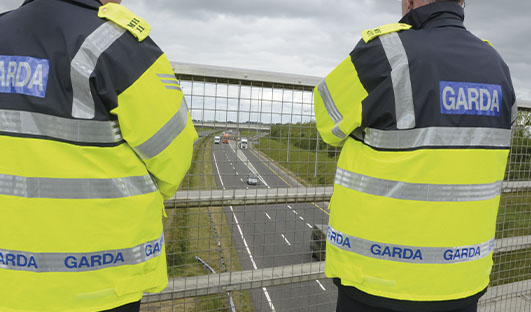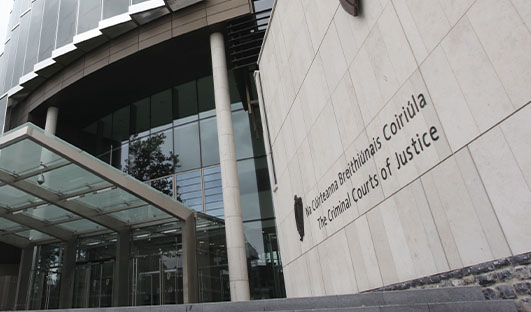Policing legislative priorities

Three major pieces of proposed legislation will consolidate efforts to reform policing in Ireland. eolas surveys the three and the progress they have made thus far.
Garda Síochána (Powers) Bill
The Garda Síochána (Powers) Bill was introduced by then-acting Minister for Justice Heather Humphreys TD in June 2021, representing a major effort on the part of the Government to modernise and update policing in Ireland, with police powers to be consolidated, targeted reforms to be introduced and new fundamental rights provisions to be included. The Bill is said to “have a strong focus on human rights”, for both the “rights of suspected or accused persons, as well as the human rights of all members of society”.
Measures in the Bill include: the introduction of a single power of arrest, increasing the scope of Garda arrest powers, but making the powers “subject to conditions to ensure the arrest is necessary in particular circumstances”; the placing of the Garda caution on a statutory basis; the introduction of a statutory right for an accused to have a lawyer present at their interview; the introduction of new Garda powers to compel a person to provide electronic device passwords when executing a search warrant; a requirement for written records of stop and search incidents; the drawing up of statutory codes of practice for gardaí in using the Bill’s powers; and special measures for child suspects and suspects with impaired capacity.
The Oireachtas Joint Committee on Justice issued its report on the pre-legislative scrutiny of the Bill in June 2022, including 10 recommendations for amendments to the Bill. These recommendations include language clarifications, the inclusion of ethnicity in the recording of stop and searches, that a provision allowing senior Garda members to approve search warrants in urgent circumstances be removed, and that actions including sanctions are introduced in response to illegal searches in order to make gardaí aware of and compliant with their obligations.
Policing, Security and Community Safety Bill
The general scheme of the Policing, Security and Community Safety Bill was introduced by Minister for Justice Helen McEntee TD in April 2021. The Bill “provides for the most wide ranging and coherent reform of policing in a generation by improving the performance and accountability of our policing and security services”.

Provisions included within the Bill include: the recognition that community safety is not the sole responsibility of gardaí and requires all State services working in tandem with local communities; the strengthening of independent oversight of gardaí through a new Policing and Community Safety Authority equipped with extra inspection powers; the expansion of the Garda Ombudsman’s remit and independence; the enhancement of internal governance with An Garda Síochána, with the Garda Commissioner becoming a ‘true CEO’, answerable to a new Garda Board; and the introduction of a new Independent Examiner of Security Legislation to strengthen oversight of national security.
Chief among Harris’s criticisms were that the legislation would see a gradual “seeping away” of his authority as commissioner and lead to him spending “more time reporting and accounting to bodies than actually overseeing policing”.
The proposed legislation seeks to reform policing based on the recommendations of the Commission on the Future of Policing in Ireland, but its proposals have been variously criticised by Garda Commissioner Drew Harris, head of the Policing Authority Bob Collins, head of the Garda Inspectorate Mark Toland and the Irish Council for Civil Liberties (ICCL). Chief among Harris’s criticisms were that the legislation would see a gradual “seeping away” of his authority as commissioner and lead to him spending “more time reporting and accounting to bodies than actually overseeing policing”. The ICCL stated its support for the oversight measures contained in the legislation but stated that the Bill should remove “all prosecutorial powers” from gardaí.
The Oireachtas Joint Committee on Justice published its pre-legislative scrutiny of the Bill in June 2022, with 12 recommendations including that the accountability structures proposed be evaluated, “particularly in terms of the various bodies to whom the Commissioner must be accountable and the time it will take to Commissioner to account to these different bodies”, that the re-assignation of prosecutorial powers to a national prosecution service be prioritised, and that a comprehensive review of the Garda Síochána Ombudsman Commission be undertaken.
Garda Síochána (Digital Recording) Bill
Former acting Minister for Justice Humphreys published the general scheme of the Garda Síochána (Digital Recording) Bill in April 2021, with the legislation providing the legal basis for the use of body cams by gardaí, as well as extending the use of CCTV and number plate recognition technology.
The Commission on the Future of Policing in Ireland recommended that legislation be introduced to provide for the use of body-worn cameras by gardaí in order to “support their front-line duties in criminal investigations and the maintenance of public safety”. The cameras will “provide accurate depictions of events, which can influence the behaviours of both members of the public and also of members of An Garda Síochána”.
The Committee published the report from its pre-legislative scrutiny of the Bill in December 2021, where it recorded 12 recommendations, including ensuring that body cams and CCTV devices not use facial recognition technology and not be used to racially profile members of the public, that the Department of Justice refer codes of practice to both public consultation and the committee prior to observation, the removal of a provision allowing gardaí to approve temporary access to third-party CCTV live feeds without judicial oversight, and the implementation of a pilot scheme to trial the use of recording devices and body cams in order to test their effectiveness and conduct human rights and data protection impact assessments before a rollout at national level.





